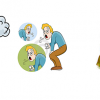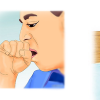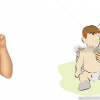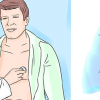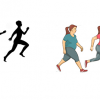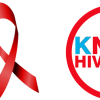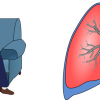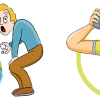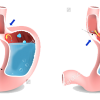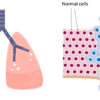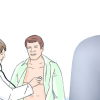Tag: blood in sputum , cough , pulmonary , smoking , weight loss
-
Difficulty swallowing (Dysphagia)
Dysphagia is the inability or difficulty in swallowing food or liquid. Normally, muscles in the throat (pharynx) and esophagus (food pipe) contract rhythmically to move food and liquids from mouth to stomach. Dysphagia occurs when there is a narrowing or lack of coordination of movem
-
Lung Cancer
Lung cancer (Bronchogenic carcinoma) is the most common type of cancer worldwide and a leading cause of cancer death for both men and women. Lung cancer occurs when the normal cells of lungs abnormally change their characteristics and grow uncontrollably. Lung cancers may be
-
Shortness of breath (Dyspnea)
Shortness of breath or dyspnea is an abnormal awareness of own breathing. It is described differently by different people. Some describe it as not getting enough air or feeling suffocated while others describe it as a sensation of chest tightness or inability to breath out completely. Dy
-
Chest Pain or Tightness
Chest pain is the pain that may be felt anywhere from the level of shoulder to the bottom of ribs. Chest pain or tightness is sometimes a serious symptom, resulting from heart attack. But having chest pain does not necessarily mean you are having a heart attack. Most people who go to the emergency room with chest pain
-
Cough
Cough is our body’s protective response to the presence of irritants in the airway. It is a reflex action caused by the stimulation of the nerve endings in the respiratory tract by stimuli such as allergen, microbes, foreign body or excessive mucous. After the stimuli reaches the bra
-
Pneumonia
Pneumonia is an infection of the lungs caused by a variety of germs. These germs reach the air sacs (lowest part of airways) after inhalation, overcoming body's normal defense mechanism like nasal hairs, mucus and cough which are weakened by smoking or dust inhalation. Once in the lungs,
-
Tuberculosis
Tuberculosis (TB) is a communicable disease caused by Mycobacterium tuberculosis. It can affect any organ in the body but lungs (Pulmonary TB) are the most common site of infection. Other common sites of infection are bones, lymph nodes, kidneys, uterus, brain (meninges), skin, etc. Tuberculosis i
-
Weight Loss
Weight loss that is meaningful clinically (in relation to your disease) is the loss of more than 5% of usual body weight over a six-month period. This arbitrary cut-off needs to be considered carefully as this does not tell about whether the given weight loss is due to loss of body fat (
-
Coughing up Blood
Coughing up blood can be alarming, even in small amounts. But not all hemoptysis is serious or life-threatening. The blood may be mixed with the sputum or it could be frank blood which could be bright red, dark brown or pink and frothy. When you cough up blood, most of the time it is c
-
HIV/AIDS
Introduction HIV (Human Immunodeficiency Virus) is the virus that causes AIDS (Acquired Immunodeficiency Syndrome). Infection by HIV weakens your immune system. When the immune system becomes too weak to fight, organisms that would otherwise not cause an infection in a normal person, that person is
-
Heart Failure
Heart failure means your heart is not able to pump out sufficient amount of blood into the rest of the body. It does not mean that your heart has stopped to beat which is called “cardiac arrest” (see Heart Attack for more informat
-
Diabetes Mellitus
Diabetes Mellitus (commonly called diabetes) is a chronic disease where your blood sugar levels are persistently high. There is an important hormone called insulin in our body that keeps the blood glucose level within normal range. Insulin is produced by pancreas which is a gland located behind the stomach between the
-
Chronic Obstructive Pulmonary Disease (COPD)
COPD is a chronic condition of the lungs that causes difficulty in breathing. It is caused by long standing exposure to irritant gas or particles most commonly by cigarette smoking. In developing countries indoor smoke exposure from firewood burning also is an important risk factor.
-
Asthma
Asthma is a chronic respiratory disease that affects your airways (windpipe). The windpipe is inflamed, narrowed and swollen that causes difficulty in breathing now and then. A person with asthma has no difficulty in breathing most of the time except during an asthma attack. As
-
Gasteroesophageal Reflux Disease
Gasteroesophageal reflux disease (GERD) is also known as acid reflux. GERD occurs is when stomach contents leak backwards (called “reflux”) into esophagus and cause symptoms or complications. Reflux is a normal process in infant, child or adult, but when it causes troublesome s
-
Cancer
Cancer is a disease of abnormal cell proliferation. In a healthy organs, cells divide and grow in a regulated and controlled fashion. When these cell start to divide and grow unpredictably and uncontrollably, it develops into a lump know as tumor. These groups of abnormal cell can infiltrate causing destruction of surr
-
Acid Reflux Disease
When we eat food, it travels through the mouth to the food pipe (esophagus) and then to the stomach. Once in the stomach, food cannot come back up into the esophagus under normal conditions because of the presence of the lower esophageal sphincter (LES). LES is a group of fiber muscle rings at the lower end of the food




